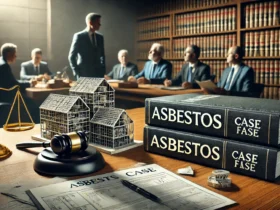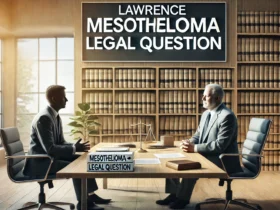Introduction
Asbestos is a dangerous material once widely used in construction and other industries. Exposure to asbestos can cause severe health issues like lung cancer and mesothelioma. This makes understanding asbestos issues vital for anyone who might come into contact with it. Legal considerations become crucial when dealing with asbestos because victims may have the right to seek compensation for their suffering. In Lancaster, local buildings and industries may have used asbestos, making it important to focus on how local laws and regulations impact asbestos cases. Addressing these Lancaster-specific concerns can help residents navigate their legal options and ensure they receive the support they need.
Understanding Asbestos
What Is Asbestos?
Asbestos is a group of natural minerals made of tiny fibers. These fibers are strong, heat-resistant, and were used in many products and building materials. Asbestos was popular in construction for its fireproof qualities and durability.
Common Uses And Risks
Asbestos was commonly used in products like insulation, roofing shingles, and floor tiles. It was also used in cement and brake pads. The main risk of asbestos is that when it breaks down, tiny fibers can become airborne. Breathing these fibers can be harmful. Asbestos is especially risky in older buildings where materials might be deteriorating.
Health Effects Of Asbestos Exposure
Inhaling asbestos fibers can cause significant health problems. Asbestos exposure can cause lung cancer, mesothelioma (a rare cancer of the lining of the lungs), and asbestosis (a chronic lung disease). These health problems may not show up until many years after exposure. Prompt diagnosis and intervention are essential for individuals impacted by this condition.
Asbestos Regulations And Legal Framework
Federal Asbestos Regulations
In the United States, federal regulations control the use and management of asbestos. The Environmental Protection Agency (EPA) sets rules to limit asbestos exposure and ensure safe removal. The Occupational Safety and Health Administration (OSHA) also has standards to protect workers who may come into contact with asbestos.
State-specific Regulations In Pennsylvania
Pennsylvania has its own asbestos regulations that build on federal rules. The Pennsylvania Department of Environmental Protection (DEP) oversees asbestos removal and disposal. State laws require proper certification for contractors handling asbestos. There are specific guidelines for testing, removal, and reporting asbestos to ensure safety and compliance.
Lancaster’s Local Asbestos Regulations
In Lancaster, local regulations add another layer of control for asbestos management. Lancaster has specific rules for asbestos in buildings and during construction projects. These rules include requirements for notifying local authorities before asbestos removal and following safety procedures to prevent contamination. Local regulations ensure that asbestos issues are managed according to both state and federal standards, addressing unique concerns of the area.
Legal Questions And Concerns In Asbestos Cases
Types Of Legal Claims Related To Asbestos
Personal Injury Claims
If you are diagnosed with an illness due to asbestos exposure, you may file a personal injury claim. This claim seeks compensation for medical costs, lost wages, and pain and suffering. It is important to prove that asbestos exposure led to your health issues.
Wrongful Death Claims
If someone has died from an asbestos-related illness, family members may file a wrongful death claim. This claim seeks compensation for loss of income, funeral expenses, and emotional distress. The family must show that asbestos exposure caused the death.
Property Damage Claims
If asbestos in a property has caused damage or devaluation, property owners can file a property damage claim. This claim addresses costs related to removing asbestos, repairing damage, and reducing the property’s value. Proof of asbestos presence and its impact is necessary.
Statute Of Limitations For Asbestos Claims
The statute of limitations is the time limit for filing asbestos claims. This limit varies by state and type of claim. In Pennsylvania, you generally have two years from the date you discover your illness or the date of a loved one’s death to file a claim. It is important to act promptly to avoid losing the right to seek compensation.
Proving Asbestos Exposure
To win an asbestos case, you must prove that asbestos exposure caused your illness or property damage. This involves showing evidence of where and when you were exposed to asbestos. Medical records, work history, and expert testimony can help establish this link. Accurate documentation and expert analysis are crucial in proving asbestos exposure and its impact.
Lancaster-Specific Asbestos Issues
Historical Asbestos Use In Lancaster
In Lancaster, asbestos was widely used in construction materials during the 20th century. Buildings, schools, and factories from this period often contain asbestos in insulation, roofing, and floor tiles. The historical use of asbestos means that many older properties in Lancaster may still have asbestos-containing materials, posing ongoing risks to residents and workers.
Local Cases And Legal Precedents
Lancaster has seen several notable asbestos cases over the years. These cases help shape local asbestos law and provide insights into how the courts handle asbestos claims in the area. Legal precedents set by these cases guide how claims are processed and what evidence is required. Understanding these local cases can be helpful for individuals pursuing legal action related to asbestos exposure.
Resources And Support For Lancaster Residents
Residents of Lancaster dealing with asbestos issues have access to various resources and support services. Local health departments and environmental agencies provide information on safe asbestos removal and disposal. There are also local organizations and support groups that offer advice, legal assistance, and emotional support for those affected by asbestos. Reaching out to these resources can help navigate the challenges of dealing with asbestos in Lancaster.
Finding Legal Assistance In Lancaster
Types Of Legal Professionals To Consult
Asbestos Attorneys
If you have an asbestos-related legal issue, consulting with an asbestos attorney is crucial. These lawyers specialize in cases involving asbestos exposure and can provide expert guidance on your legal options. They help with filing claims, gathering evidence, and representing you in court.
Personal Injury Lawyers
For health issues caused by asbestos, a personal injury lawyer can also be valuable. These lawyers handle cases where individuals seek compensation for injuries, including those from asbestos exposure. They can assist with proving your case and negotiating settlements.
How To Choose The Right Lawyer
Choosing the right lawyer involves several factors. Look for attorneys with experience in asbestos cases and a good track record. Check their reputation, client reviews, and success in similar cases. Ensure they offer a clear plan for handling your case and discuss their fees upfront. Finding a lawyer with local knowledge and expertise in Lancaster can be especially beneficial.
Free Or Low-cost Legal Resources
For those who need affordable legal help, there are resources available in Lancaster. Some non-profit organizations and legal aid services offer free or low-cost assistance. Community legal clinics and local bar associations can also provide support or refer you to affordable legal professionals. These resources can help you access legal advice and representation even if you have a limited budget.
Recent Legal Developments And Trends
Recent Court Cases And Rulings
In recent years, there have been notable court cases and rulings related to asbestos. These cases often address issues like the extent of liability for asbestos exposure and the amount of compensation awarded. Recent rulings may set new precedents for how asbestos claims are handled, influencing the legal landscape for victims seeking justice. Staying updated on these cases helps understand current legal standards and expectations for asbestos lawsuits.
Changes In Asbestos Legislation
Asbestos legislation continues to evolve at both federal and state levels. Recent changes may include stricter regulations for asbestos removal, increased penalties for non-compliance, and new safety standards. Legislative updates might also affect the process for filing claims and the types of damages available. Keeping informed about these changes is crucial for those involved in asbestos cases, as new laws can impact both the rights of victims and the responsibilities of property owners and employers.
Preventive Measures And Safety Guidelines
Asbestos Removal And Abatement
Asbestos removal involves safely removing asbestos materials from a property. This process must be done by certified professionals to avoid the release of harmful fibers into the air. Abatement includes not only removal but also encapsulating or repairing asbestos materials to prevent exposure. Proper handling during removal ensures that asbestos does not pose a risk to residents or workers. Always follow safety protocols to minimize health risks.
Legal Requirements For Asbestos Handling
Asbestos handling is subject to strict legal requirements. Federal, state, and local laws set standards for how asbestos must be managed. These requirements include notifying authorities before starting asbestos removal, using licensed contractors, and following specific procedures for disposal. Compliance with these regulations is essential to ensure safe asbestos management and avoid legal penalties. Knowing and adhering to these legal guidelines helps protect both public health and your legal rights.
Conclusion
Asbestos poses significant health risks due to its use in past construction, making understanding legal considerations crucial. This includes managing claims related to personal injury, wrongful death, and property damage. Knowing federal, state, and local regulations, especially those specific to Lancaster, is essential for proper asbestos management. Recent changes in asbestos legislation and court rulings further influence how these cases are addressed. For Lancaster residents, seeking advice from experienced asbestos attorneys or personal injury lawyers, staying updated on legal developments, and adhering to safety guidelines are key steps to effectively navigate asbestos legal issues, ensuring both health protection and legal compliance.
Frequently Asked Questions (FAQs)
What Should I Do If I Discover Asbestos In My Property?
If you discover asbestos on your property, the first step is to avoid disturbing it, as this can release harmful fibers into the air.Contact a licensed asbestos professional to assess the situation and recommend appropriate action. They can perform an inspection, determine the condition of the asbestos materials, and advise on safe removal or encapsulation. It’s important to follow all safety guidelines and local regulations regarding asbestos management to protect your health and comply with legal requirements.
How Can I File An Asbestos Claim In Lancaster?
To file an asbestos claim in Lancaster, start by gathering evidence of asbestos exposure and related health issues or property damage. Consult with a specialized asbestos attorney or personal injury lawyer who can guide you through the process. They will help you collect necessary documentation, file the claim, and represent you in legal proceedings. Ensure that you adhere to the statute of limitations for filing claims in Pennsylvania, which is generally two years from the discovery of your illness or the death of a loved one.
What Compensation Can I Expect From An Asbestos Lawsuit?
Compensation from an asbestos lawsuit can vary based on the nature and severity of the exposure and its impact. In general, compensation may cover medical expenses, lost wages, pain and suffering, and, in wrongful death cases, funeral costs and loss of income. Property damage claims may address the costs of asbestos removal and repair. The amount of compensation depends on the specifics of your case, including the evidence presented and the legal precedents applied. Consulting with an asbestos attorney can provide a clearer estimate based on your individual situation.












Got a Questions?
Find us on Socials or Contact us and we’ll get back to you as soon as possible.